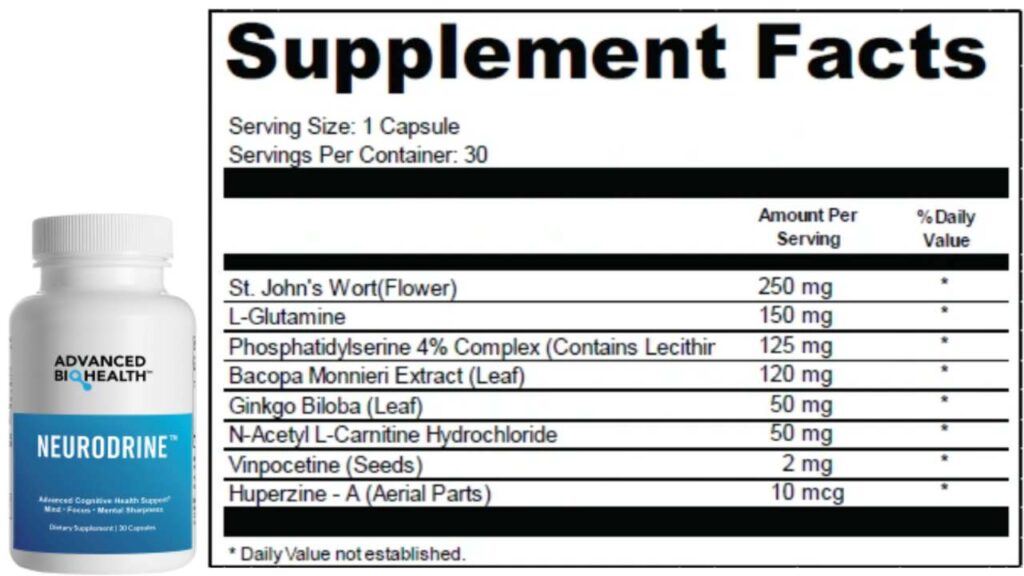When it comes to brain health, many people are looking for an edge. With so many supplements on the market, it’s easy to be tempted by promises of sharper focus and better memory.
Neurodrine is one such supplement, claiming to offer a natural boost to cognitive function.
But, is it really as effective as it claims?
Or is it just another product with big promises and little to back them up?
Neurodrine contains ingredients like Bacopa Monnieri, Huperzine A, St. John’s Wort, Ginkgo Biloba, and Vinpocetine.
These components are often highlighted for their potential cognitive benefits. But here’s the catch—just because a supplement contains these ingredients doesn’t necessarily mean it will work.
The United States Food and Drug Administration (FDA) does not evaluate dietary supplements for effectiveness. Unlike prescription drugs, these products aren’t required to prove they work before hitting the shelves.
This lack of oversight can leave consumers in a tough spot. How do you know if Neurodrine will actually deliver on its promises? Can you trust that it’s safe to take?
In 2018, the FDA even issued warnings to companies selling supplements that falsely claimed to treat or prevent serious conditions like Alzheimer’s disease.
So, where does Neurodrine stand in all of this?
Is it a legitimate option for those looking to improve their brain health, or is it just another scam?
Before you decide to buy, it’s worth taking a closer look at the science behind Neurodrine and whether its claims hold up under scrutiny.
However, before we dive into whether Neurodrine is a scam, let’s first look at who makes this supplement.
Who Is The Manufacturer of Neurodrine?
Neurodrine is produced by a company called Advanced Biohealth, based in Aurora, Colorado. They market themselves as a company committed to using high-quality ingredients and the latest research to ensure their supplements are both effective and safe.
But how much trust can we place in these claims?
Advanced Biohealth presents itself as a reliable source of health supplements. They offer customer support via phone and email, which might seem like a good sign.
Their quick response time can be reassuring for customers who have questions or concerns. However, fast customer service doesn’t necessarily mean the product itself is trustworthy or effective.
One of the most eye-catching aspects of Neurodrine is the 364-day money-back guarantee. That’s nearly a full year to decide if the supplement works for you.
At first glance, this might seem like an amazing deal. But it also raises a few questions.
Why do they offer such a long guarantee period?
Is it because they’re confident in their product’s effectiveness, or is it just a tactic to make you feel secure enough to make a purchase?
It’s something worth thinking about before you decide to invest in the product.
The company also offers discounts if you buy in bulk. A single bottle of Neurodrine costs $69, but if you order six bottles, the price drops to $49 each.
They also have a three-month supply option at $59 per bottle. While these discounts might seem like a great way to save money, they also make you wonder why a supplement that’s supposedly so effective needs such heavy promotions. If it works so well, why offer such steep discounts?
When you start taking Neurodrine, Advanced Biohealth recommends that you closely monitor how your body reacts to the supplement.
They suggest giving it at least three months before deciding if it’s effective. This sounds like a reasonable approach, but it also means you could be spending a lot of time and money on something that may not deliver the results you’re hoping for.
The company also points out that while some users might notice changes within three months, others may need six months or longer to see any benefits.
This kind of variability can make you question how consistent the product’s effects really are.
If the results differ so much from person to person, how can you be sure it’s worth the investment?
The Science Behind Neurodrine Supplement

Before we decide if Neurodrine is a scam, let’s look at the science behind it. Neurodrine is a brain supplement that contains several well-known ingredients.
These include Bacopa Monnieri, Huperzine A, St. John’s Wort, Ginkgo Biloba, and Vinpocetine.
The makers of Neurodrine claim that these ingredients can improve brain health, boost memory, and enhance focus. But how strong is the science behind these claims?
Let’s take a closer look.
Bacopa Monnieri

Bacopa Monnieri is an herb that has been used in traditional Ayurvedic medicine for centuries. It’s often praised for its ability to improve memory and cognitive function. Some studies support these claims.
For example, research in mice has shown that Bacopa Monnieri can improve learning and memory. It works by increasing the growth and branching of dendrites, which are parts of nerve cells in the brain linked to learning and memory.
Human studies also show some promise.
In one study, healthy adults who took 300 mg of Bacopa Monnieri daily for 12 weeks showed improvements in how quickly they processed visual information, how fast they learned, and their memory.
Another study on older adults found that Bacopa Monnieri improved memory, attention, and information processing.
However, it’s worth noting that not all studies show such positive results. The effects can vary depending on the dosage and the individual taking it.
Huperzine A

Huperzine A is a compound derived from Chinese club moss. It’s known for its potential to improve memory and mental function.
Huperzine A works by increasing levels of acetylcholine, a chemical in the brain that is crucial for memory and learning. Because of this, Huperzine A is often used to treat Alzheimer’s disease and other forms of dementia.
Some evidence supports its effectiveness in improving cognitive function, especially in people with memory problems.
However, the evidence for its effectiveness in healthy people is less clear. It’s also important to be cautious with Huperzine A. It can cause side effects like nausea, diarrhea, and insomnia. It can also interact with other medications, leading to unwanted effects.
St. John’s Wort

St. John’s Wort is an herb that’s mainly used for treating mild to moderate depression.
It works by preventing the brain from using up neurotransmitters like serotonin, dopamine, and GABA too quickly. This action helps improve mood and reduce anxiety.
While St. John’s Wort is effective for some people with depression, its use for enhancing brain function isn’t well-proven.
There’s limited evidence to support its effectiveness in boosting cognitive function directly.
Ginkgo Biloba

Ginkgo Biloba is one of the oldest tree species and has been used in traditional Chinese medicine for thousands of years.
The leaves of the Ginkgo Biloba tree contain flavonoids and terpenoids, which have antioxidant properties and help improve blood circulation. Because of these effects, Ginkgo Biloba is often used to enhance focus, mental clarity, and memory.
Some studies suggest that Ginkgo Biloba can improve cognitive function, especially in people with cognitive impairments like dementia.
However, the evidence for its benefits in healthy individuals is mixed. Some studies show slight improvements in memory and cognitive speed, while others find no significant effects.
Vinpocetine
Vinpocetine is a synthetic compound derived from the periwinkle plant. It’s often used in Europe and Asia to treat cognitive decline and various brain-related disorders.
Vinpocetine is believed to work by increasing blood flow to the brain, improving the brain’s use of oxygen, and protecting brain cells from damage.
Some studies suggest that Vinpocetine can improve memory and cognitive function, especially in people with dementia or other cognitive impairments.
Is the Science Behind Neurodrine Strong?
When we look at the ingredients in Neurodrine, it’s clear that some of them have scientific backing. Bacopa Monnieri, Huperzine A, St. John’s Wort, Ginkgo Biloba, and Vinpocetine have all been studied for their potential benefits to brain health.
However, it’s important to approach these claims with caution.
Most studies supporting these ingredients are small or conducted on people with cognitive impairments.
The evidence for their effectiveness in healthy people looking to boost brainpower is less solid. Plus, the effects of these ingredients can vary widely from person to person. Just because something worked in a study doesn’t mean it will work for everyone.
Another point to consider is the quality and consistency of these ingredients in supplements like Neurodrine. Supplements are not regulated as strictly as prescription drugs, so the amount and purity of the ingredients can vary from batch to batch. This makes it even harder to know if you’re getting what you think you are.
Finally, while these ingredients may have some benefits, they also come with potential risks. Side effects, drug interactions, and variability in how your body responds are all factors to consider.
So?
Is Neurodrine a scam?
Is Neurodrine a scam? That’s a question many people ask when they come across brain supplements promising to boost memory and focus.
Neurodrine is marketed as a natural way to improve brain health, using ingredients like Bacopa Monnieri, Huperzine A, St. John’s Wort, and Ginkgo Biloba.
These ingredients have some studies backing their potential benefits, but does that make Neurodrine a miracle solution?
Let’s dig deeper.
First, it’s important to understand how supplements are regulated—or, more accurately, how they’re not regulated.
Unlike prescription drugs, dietary supplements don’t have to go through rigorous testing to prove they work before they hit the market.
This means companies can make bold claims without solid evidence. You might see statements like “improves memory” or “supports brain function,” but these aren’t backed by the FDA.
That’s why every supplement carries a disclaimer that it’s not meant to diagnose, treat, or cure any disease.
When it comes to brain supplements like Neurodrine, the science is shaky. Yes, some studies suggest that ingredients like Bacopa Monnieri may help with memory, but these studies often involve people with existing cognitive issues, not healthy individuals looking for a mental edge.
The effects on a healthy brain might be minimal or non-existent.
Moreover, the supplement industry is huge—worth billions of dollars. With so many products on the market, it’s hard to know which ones are truly effective and which ones are just capitalizing on people’s hopes.
The fact that Neurodrine offers a 364-day money-back guarantee might seem like a sign of confidence, but it could also be a way to make you feel secure enough to buy without questioning too much.
Another point to consider is that taking a supplement might seem like an easy solution, but it’s not a substitute for proven methods of improving brain health.
Regular exercise, a healthy diet, staying socially active, and getting enough sleep are all scientifically proven to benefit your brain in the long term.
Popping a pill might be convenient, but it’s not a magic fix.
Finally, while Neurodrine contains ingredients that have shown some promise in research, the effects can vary widely from person to person.
What works for one might do nothing for another. There’s also the risk of side effects or interactions with other medications you’re taking.
So, is Neurodrine a scam?
It’s not a straightforward “yes” or “no” answer.
Taking a supplement might seem like an easy solution, but it’s not a substitute for proven methods of improving brain health. Regular exercise, a healthy diet, staying socially active, and getting enough sleep are all scientifically proven to benefit your brain in the long term. Popping a pill might be convenient, but it’s not a magic fix.
That said, some users have reported positive experiences with Neurodrine. They’ve mentioned feeling more focused and mentally sharp. For those people, it seems to be beneficial. Everyone’s body reacts differently, and what works for one person might not work for another.
If you haven’t tried Neurodrine yet, you might consider giving it a shot to see if it works for you. However, if you have any medical conditions, it’s wise to consult your doctor before starting any new supplement.
See Neurodrine Official Website Official Website
References:
7 Emerging Benefits of Bacopa monnieri (Brahmi) (healthline.com)
HUPERZINE A: Overview, Uses, Side Effects, Precautions, Interactions, Dosing and Reviews (webmd.com)
Ginkgo biloba for cognitive improvement in healthy individuals – PMC (nih.gov)

